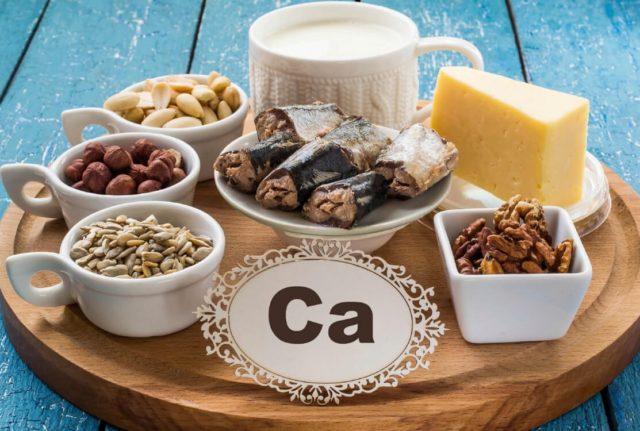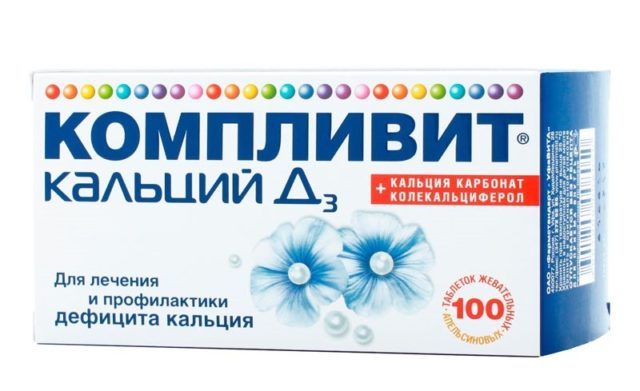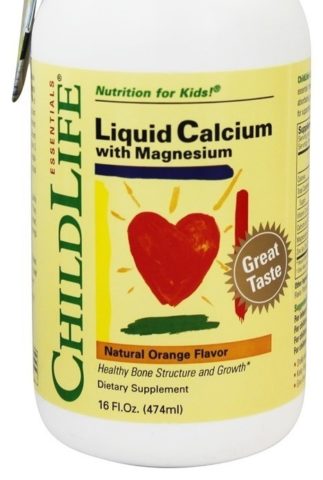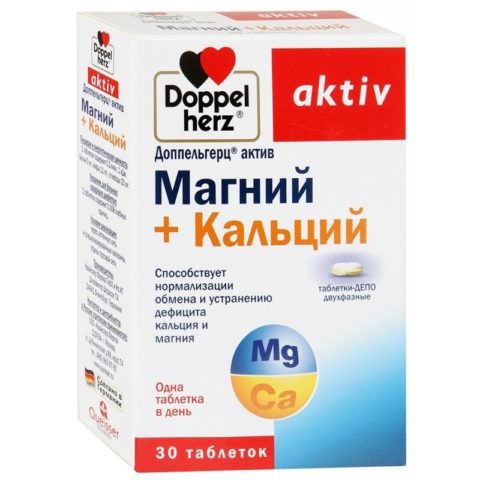Content
- 1 The role of calcium in the child's body
- 2 Why is there a deficit
- 3 Signs of a lack of calcium in the body
- 4 Daily calcium intake for children
- 5 The best vitamin complexes with calcium for children
- 6 Rules for choosing children's vitamins with calcium
- 7 Rules for taking vitamins
- 8 Contraindications and side effects
- 9 Conclusion
- 10 Reviews of vitamins with calcium for children
Calcium is one of the most important trace elements. Its lack is manifested in the deterioration of the condition of teeth, hair, nails and bone tissue. However, vitamins with calcium for children should be prescribed by a specialist. This is due to the fact that an excess of a substance is no less dangerous than its lack.

An important mineral found in dairy products, nuts and fish
The role of calcium in the child's body
Calcium is responsible for building the skeleton. The substance can be excreted from the body through sweat and faeces. Insufficient intake of a trace element causes its leaching from the bone tissue.
The following nutrient properties are known:
- participation in digestion and enzyme work;
- reducing the risk of allergic reactions;
- pressure regulation;
- creating conditions for blood clotting;
- normalization of brain functioning.
Calcium is not produced in the body. The trace element comes with food, as well as in the form of dietary supplements. The assimilation of the substance occurs exclusively with the required amount of vitamin D. It is a so-called calcium conductor and allows the absorption of a trace element from the intestine to ensure adequate absorption by the bone tissue.
Why is there a deficit
Daily intake of calcium in the body prevents its deficiency. If a child receives a micronutrient with breast milk, the woman should eat well and additionally take dietary supplements. A decrease in calcium levels to critical values can lead to the development of rickets.
Lack of calcium may be the result of a slight intake of vitamin D3, which acts as a conductor. That is why in the cold season, experts recommend an additional intake of a useful component. In spring and summer, vitamin D3 is synthesized in the child's body under the influence of ultraviolet rays.
The following factors can lead to hypocalcemia:
- gastrointestinal diseases, for example, colitis, gastritis;
- taking certain medications that interfere with the absorption of substances.
Signs of a lack of calcium in the body
Symptoms of an essential nutrient deficiency vary with the age of the child. Usually, the following signs indicate a lack of calcium:
- increased fragility of bones;
- lamination and deformation of the nail plate;
- delayed hair growth and hair loss;
- deterioration of the condition of the enamel of the teeth;
- a decrease in the concentration of hemoglobin in the blood;
- the appearance of seizures;
- the development of rickets;
- violation of visual acuity;
- loss of skin elasticity;
- increased nervousness and irritability;
- sweating;
- rolling out hair;
- flinching;
- deformity of the lower limbs, sternum and curvature of the spine;
- decreased visual acuity.
The appearance of characteristic symptoms is associated with the influence of calcium on various systems and organs of the child:
- muscle tone and contraction;
- conduction of nerve impulses;
- ensuring adequate blood clotting;
- strengthening of the vascular walls;
- hormone production;
- activation of enzymes.
Sufficient intake of nutrients in the child's body has a positive effect on the state of the nervous and endocrine systems, the musculoskeletal system. The trace element produces an anti-inflammatory effect and the necessary anti-stress effect, provides resistance to known allergens.
Daily calcium intake for children
Indicators of intake of a useful substance in the body depend on the age of the child:
- babies - 200 mg;
- up to 3 years - 500 mg;
- 3-8 years old - 800 mg;
- 8-13 years old - 1300 mg.
Children 13 years of age and older should receive 1000 mg of Ca daily.
It is often difficult to obtain a trace element along with food. That is why doctors often recommend getting the daily intake of a substance with the help of biologically active additives.
The best vitamin complexes with calcium for children
Calcium preparations can be roughly divided into several varieties:
- Monopreparations (lactate, carbonate, calcium citrate). The substance is contained without the addition of other active ingredients.
- Combined funds. Supplements also include vitamin D.
- Multivitamins. Supplements differ in the presence of various beneficial components.
Complivit calcium D3
The complex is recommended by doctors to stimulate the metabolism of beneficial nutrients. The drug is in the form of chewable fruit lozenges taken with meals. The active substance content is 500 mg.
Supplements can be taken by children from 3 years old. Its advantages include:
- replenishment of the deficiency of D3 and Ca;
- relieving symptoms of osteoporosis;
- budget.
The supplement should not be taken in the presence of allergic reactions. Complivit is not recommended for pregnant women.

Vitamishki Calcium +
It is a balanced complex containing vitamins and minerals. The gummy lozenges are in the form of bears with vegetable and fruit extracts. Strengthening bones, teeth and reducing the risk of caries are provided due to the intake of phosphorus, vitamin D and calcium into the child's body.
A dietary supplement can be used from 3 years of age. The dosage is 1 lozenge, taken twice with meals. After 7 years, the dose is doubled.

Solgar kangavites
Tropical fruit flavored chewable tablets include vitamins and minerals:
- ascorbic acid;
- retinol;
- vitamin D;
- tocopherol;
- calcium;
- biotin;
- magnesium;
- soy lecithin;
- chromium;
- selenium;
- thiamine;
- riboflavin;
- B6, B12;
- niacin;
- folic acid;
- copper;
- zinc;
- iodine:
- choline;
- potassium.
A specially selected composition supplies the child's body with the necessary substances for development:
- extracts of broccoli, apples, carrots, beets, apricots;
- citrus bioflavonoids.
Dietary supplements are prescribed for children 1 tablet per day, starting from 6 years of age. Each pack contains 60, 120 gummies.

Child Life with Calcium and Magnesium
This dietary supplement comes in the form of a citrus-flavored syrup. The essence contains 16 fl oz (474 ml). The complex includes:
- magnesium;
- calcium;
- vitamin D;
- zinc.
Shake the bottle well before using the product. The syrup dose corresponds to the child's age:
- 6-12 months - 1 teaspoon;
- 1-3 years - 2 teaspoons;
- 4-8 years old - 1 tablespoon;
- from 9 years old - 2 tablespoons.
The use of the essence is allowed from 6 months. If desired, the syrup can be added to any drinks.

Doppelherz Active Magnesium + Calcium
Children's vitamins with calcium and magnesium are produced in tablet form (30 and 80 pieces per pack).The use of the complex is recommended for unbalanced nutrition, increased need for substances, high mental and physical exertion, prolonged stress.
The tablets are taken once a day with meals. The drug should not be used in case of hypersensitivity reactions, pregnancy and lactation. Supplements are prescribed for children over 12 years old.

Rules for choosing children's vitamins with calcium
The correct selection of dietary supplements is essential. The drugs are intended for children of different age groups, taking into account the required dosages. Means for infants are usually produced in liquid form (syrup).
When choosing complexes, you need to carefully study their composition. The presence of natural ingredients minimizes the risk of adverse reactions.
Rules for taking vitamins
The drugs are taken according to the instructions. It is strongly not recommended to exceed the indicated dosage corresponding to age. Otherwise, allergic reactions and hypervitaminosis may occur, which is dangerous with the development of various complications.
Contraindications and side effects
Vitamins for children with calcium content are not prescribed in case of a tendency to allergic reactions, hypersensitivity to the components of the drug. Side effects usually include disorders related to the functioning of the digestive system:
- flatulence;
- nausea;
- stool disorder (constipation or diarrhea).
In some cases, allergic manifestations are possible, including itching and rashes. With hypervitaminosis, renal function is impaired, changes in the psychoemotional state are observed.
Conclusion
Vitamins with calcium for children can compensate for the deficiency of an important nutrient. Often, vitamin complexes include other useful components that normalize the functioning of organs and systems of the child's body.
Reviews of vitamins with calcium for children
Reviews contain information about good children's vitamins with calcium.

